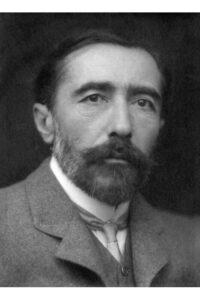
Heart of Darkness
Charles Marlow tells his friends how he became captain of a river steamboat for an ivory trading company. As a child, Marlow was fascinated by “the blank spaces” on maps, particularly Africa. The image of a river on the map particularly fascinated Marlow. In a flashback, Marlow travels to Africa, taking passage on a steamer. He travels 30 mi (50 km) up the river where his company’s station is. Work on a railway is taking place. Marlow explores a narrow ravine and is horrified to find himself in a place full of critically ill Africans who worked on the railroad and are now dying. Marlow must wait for ten days in the company’s devastated Outer Station. Marlow meets the company’s chief accountant, who tells him of Mr. Kurtz, who is in charge of a critical trading post and is described as a respected first-class agent.
The accountant predicts that Kurtz will go far. Marlow departs with 60 men to travel to the Central Station, where the steamboat he will command is based. At the station, he learns that his steamboat has been wrecked in an accident. The general manager informs Marlow that he cannot wait for Marlow to arrive and tells him of a rumour that Kurtz is ill. Marlow fishes his boat out of the river and spends months repairing it. Delayed by the lack of tools and replacement parts, Marlow is frustrated by the time it takes to perform the repairs. He learns that Kurtz is resented, not admired, by the manager. Once underway, the journey to Kurtz’s station takes two months. The journey pauses for the night about 8 miles (13 km) below the Inner Station. In the morning, the boat is enveloped by a thick fog. The steamboat is later attacked by a barrage of arrows, and the helmsman is killed. Marlow sounds the steam whistle repeatedly, frightening the attackers away. After landing at Kurtz’s station, a man boards the steamboat: a Russian wanderer who strayed into Kurtz’s camp. Marlow learns that the natives worship Kurtz and that he has been ill.
The Russian tells of how Kurtz opened his mind and admires him even for his power and willingness to use it. Marlow suspects that Kurtz has gone mad. Marlow observes the station and sees a row of posts topped with the severed heads of natives. Kurtz appears around the corner of the house with supporters who carry him as a ghost-like figure on a stretcher. The area is filled with natives ready for battle, but Kurtz shouts something, and they retreat. His entourage carries Kurtz to the steamer and lays him in a cabin. The manager tells Marlow that Kurtz has harmed the company’s business in the region because his methods are “unsound”. The Russian reveals that Kurtz believes the company wants to kill him, and Marlow confirms that hangings were discussed.
Read or download Book
Joseph Conrad
Joseph Conrad (born Józef Teodor Konrad Korzeniowski, Polish: 3 December 1857 – 3 August 1924) was a Polish-British novelist and short story writer.
Biography
He is regarded as one of the greatest writers in the English language. However, he did not speak English fluently until his twenties. He came to be considered a master prose stylist who brought a non-English sensibility into English literature. He wrote novels and stories, many in nautical settings, that depict crises of human individuality amid what he saw as an indifferent, mysterious, and amoral world. Conrad is considered a literary impressionist by some and an early modernist by others, though his works also contain elements of 19th-century realism. His narrative style and anti-heroic characters, as in Lord Jim, for example, have influenced numerous authors. Many dramatic films have been adapted from and inspired by his works. Multiple writers and critics have commented that his fictional works, written mainly in the first two decades of the 20th century, seem to have anticipated later world events.
Writing near the peak of the British Empire, Conrad drew on the national experiences of his native Poland—during nearly all his life, parceled out among three occupying empires and on his own experiences in the French and British merchant navies, to create short stories and novels that reflect aspects of a European-dominated world—including imperialism and colonialism—and that profoundly explore the human psyche. Postcolonial analysis of Conrad’s work has stimulated substantial debate; in 1975, author Chinua Achebe published an article denouncing Heart of Darkness as racist and dehumanizing, whereas other scholars, including Adam Hochschild and Peter Edgerly Firchow, have rebutted Achebe’s view.






